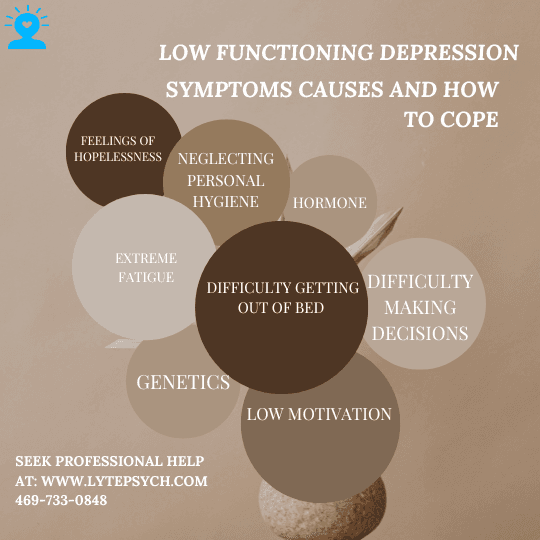Fri May 09 2025
Low Functioning Depression: Symptoms, Causes and How to Cope at Lyte Psychiatry, Best Psychiatrist and Therapist Near You (Affordable Adults and Adolescents Therapist and Psychiatrist Near You) Dallas, TX

Low Functioning Depression: Symptoms, Causes & How to Cope at Lyte Psychiatry
Best Psychiatrist and Therapist Near You (Affordable Adults and Adolescents Therapist and Psychiatrist Near You) – Dallas, TX
Depression looks different for everyone. While some people may mask their struggles and keep going through daily life, others may find themselves unable to keep up with basic tasks and responsibilities. This is often called Low Functioning Depression—a term used to describe depression that severely impacts daily functioning.
At Lyte Psychiatry in Dallas, TX, we understand that depression doesn’t always look like sadness. Sometimes it looks like exhaustion, disconnection, or simply not being able to get out of bed. If this sounds familiar, you’re not alone—and there is help.
What Is Low Functioning Depression?
🔷 Maintain work or school responsibilities
🔷 Manage household tasks or hygiene
🔷 Engage in social relationships
🔷 Practice basic self-care
Common Symptoms of Low Functioning Depression
While symptoms may vary, common signs include:
🔷 Extreme fatigue, even after sleeping
🔷 Difficulty getting out of bed or completing simple tasks
🔷 Neglecting personal hygiene or health
🔷 Feelings of hopelessness or numbness
🔷 Low motivation and difficulty making decisions
What Causes Low Functioning Depression?
Depression is complex and can be triggered by a variety of factors, including:
🔷 Genetics & Family History – A higher risk if depression runs in your family
🔷 Chronic Stress or Trauma – Ongoing hardship, grief, or abuse
🔷 Medical Conditions – Hormonal imbalances, chronic illness, or neurological factors
🔷 Substance Use – Alcohol or drug use can worsen symptoms
🔷 Environmental Factors – Isolation, lack of social support, financial hardship
🔷 Chemical Imbalance – Disruptions in brain chemicals like serotonin and dopamine
How to Cope and Manage Low Functioning Depression
✅ 1. Seek Professional Support: The most important step is reaching out for professional help. At Lyte Psychiatry, we offer:
🔷 Therapy – Talk therapy, CBT, supportive counseling
🔷 Medication Management – Antidepressants, mood stabilizers, and more
🔷 Integrated Care – Combining therapy and medication as needed
🔷Adolescent and Adult Services – Tailored to your age and lifestyle
✅ 2. Set Micro Goals: When depression makes daily tasks feel impossible, start small:
🔷 Drink a glass of water
🔷 Take a short walk Small victories matter—and they add up.
✅ 3. Build a Support Network: Even when you want to isolate, try to stay connected. A text, a call, or a visit with a trusted friend or family member can make a big difference.
✅ 5. Create Structure & Routine: Predictability can help soothe an overwhelmed mind. Try to maintain consistent sleep, meals, and gentle activities—even on the tough days.
Seek Professional Help Near You at Lyte Psychiatry (Affordable Therapist and Psychiatrist Near You) Dallas & Arlington, TX
👉 Book your consultation today with a trusted providers and therapist at Lyte Psychiatry in Dallas, TX. Click Here
To see our services. Click Here
Call us if you have questions at 469-733-0848
📍 Virtual and in-person sessions available across Texas.
Frequently Asked Questions:
Q: What’s the difference between low functioning and high functioning depression?
A: Low functioning depression significantly impacts daily tasks and self-care, while high functioning depression allows a person to “keep up appearances” but still suffer internally.
Q: Do I need medication to treat low functioning depression?
A: Not always. Some people benefit from therapy alone; others find a combination of therapy and medication most effective. We’ll help you explore the best option for you.
Q: Do you treat teens with depression?
A: Yes! We provide therapy and medication management tailored to adolescents and young adults, along with family support when helpful.
Q: How soon can I start feeling better?
A: Many people begin to notice improvement within weeks of starting treatment, though full recovery may take longer. Consistency and professional support make a big difference.
Q: Is treatment at Lyte Psychiatry affordable?
A: Yes. We accept most major insurance plans and offer affordable self-pay options to ensure care is accessible.